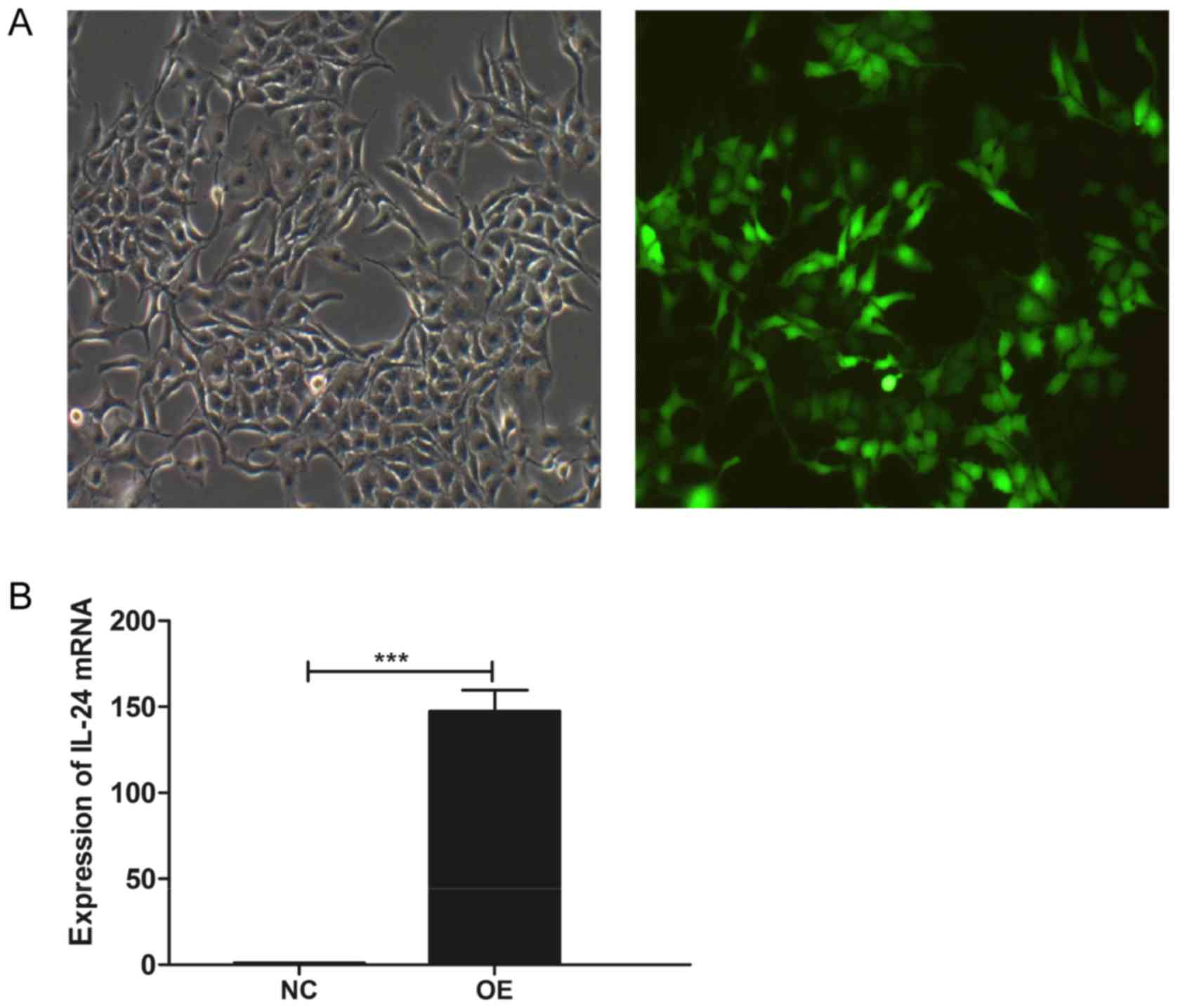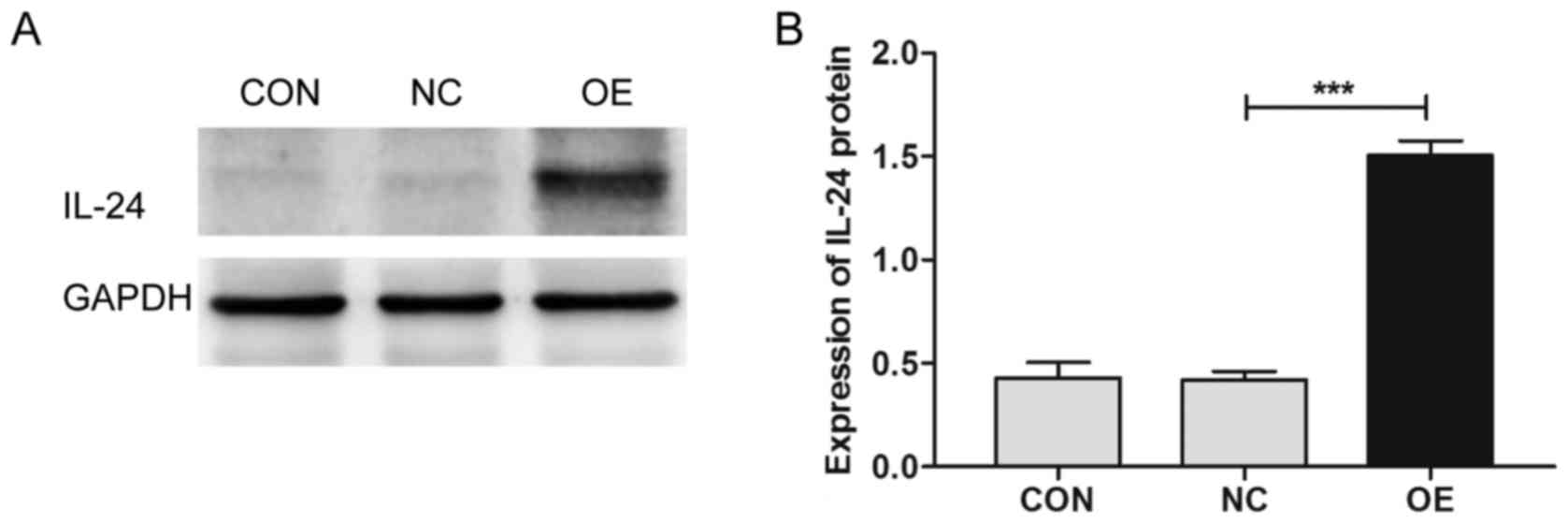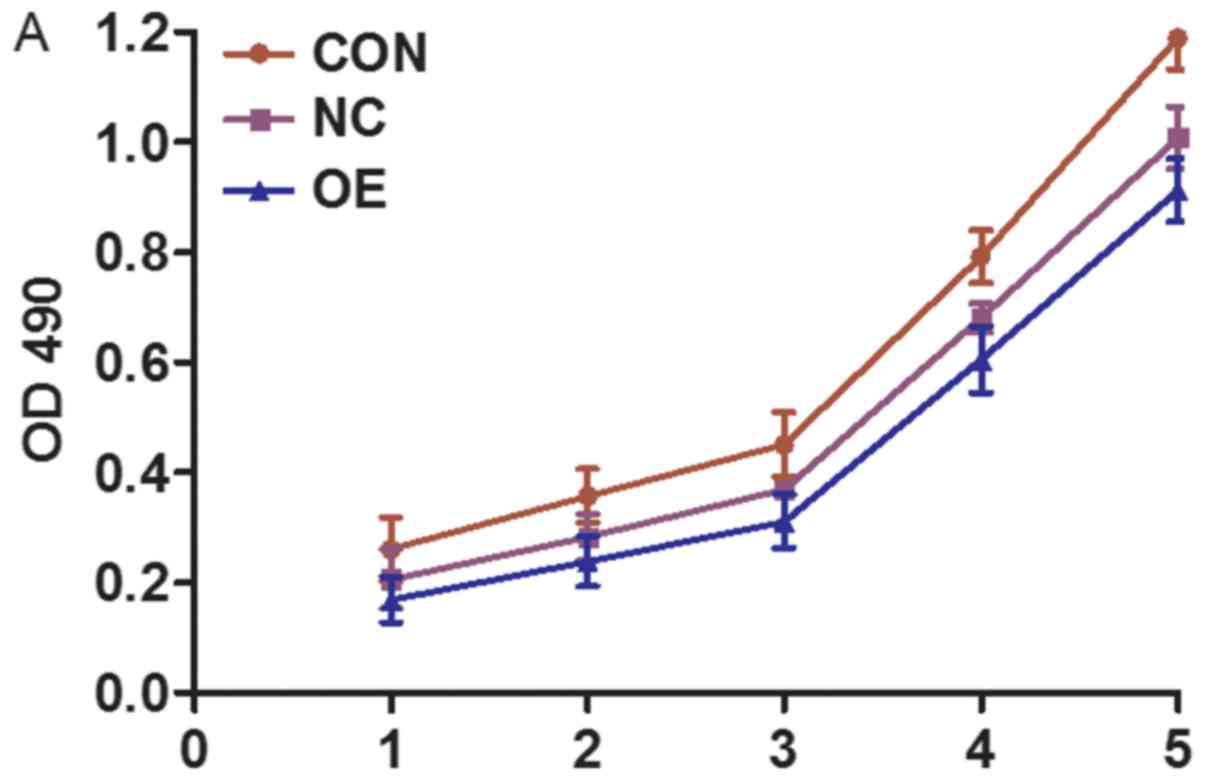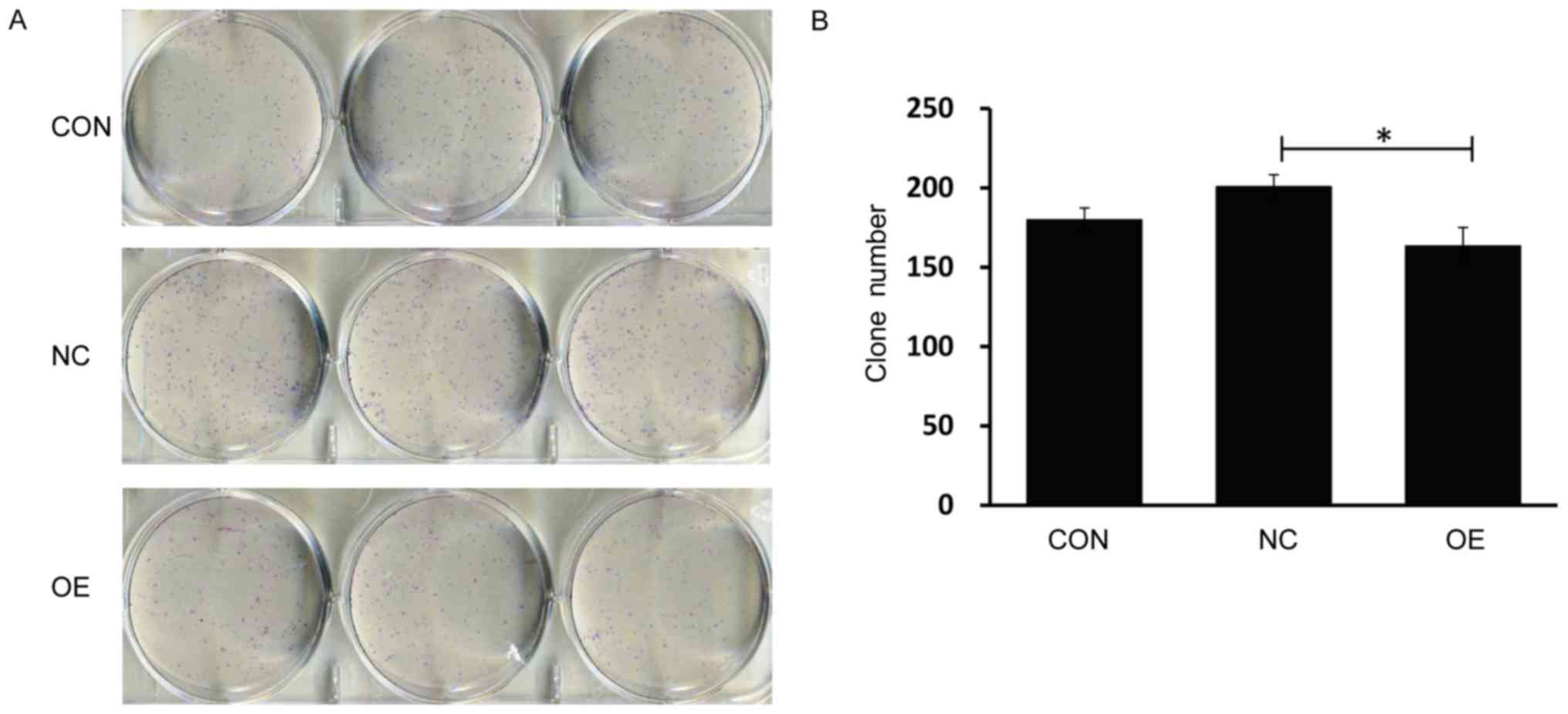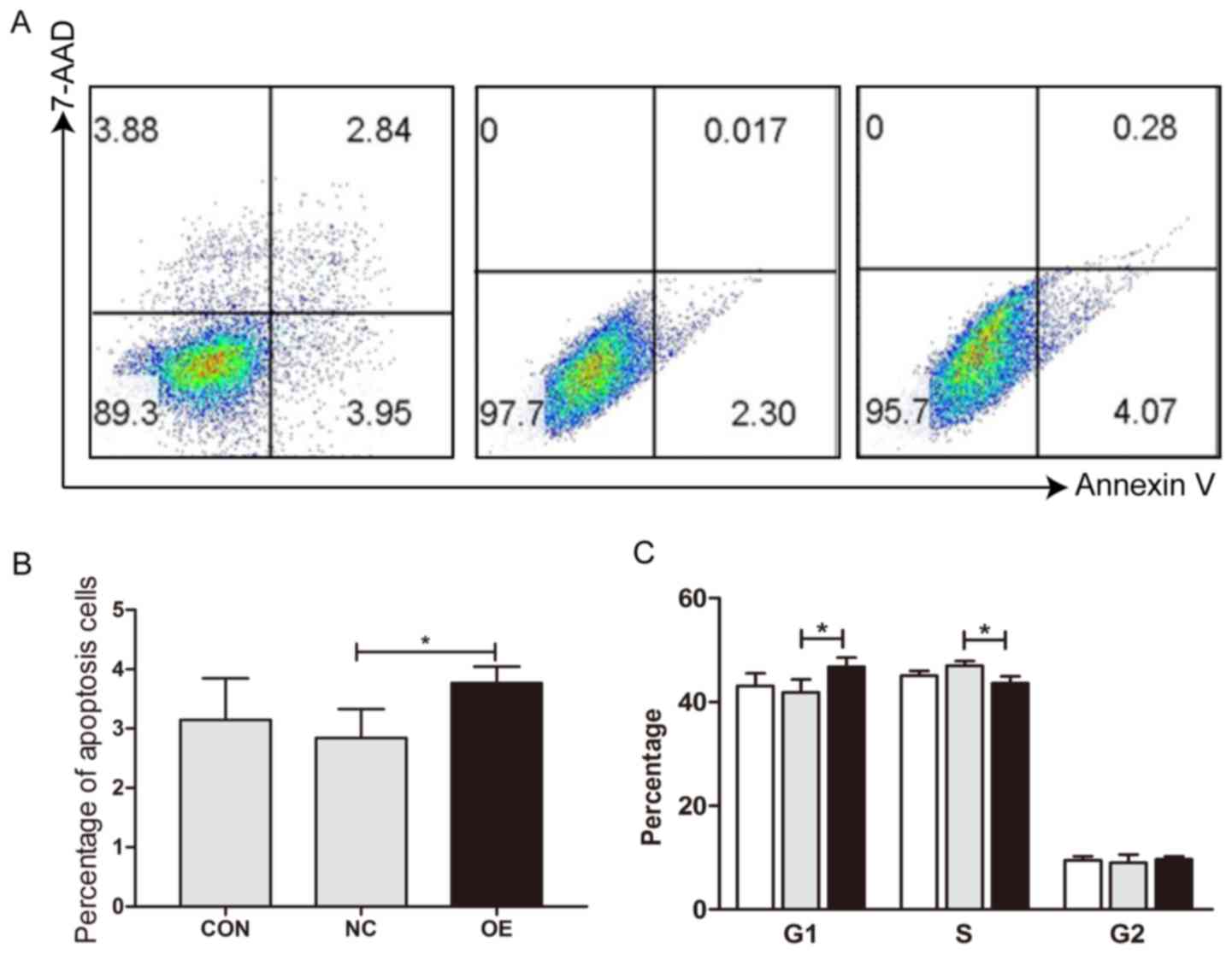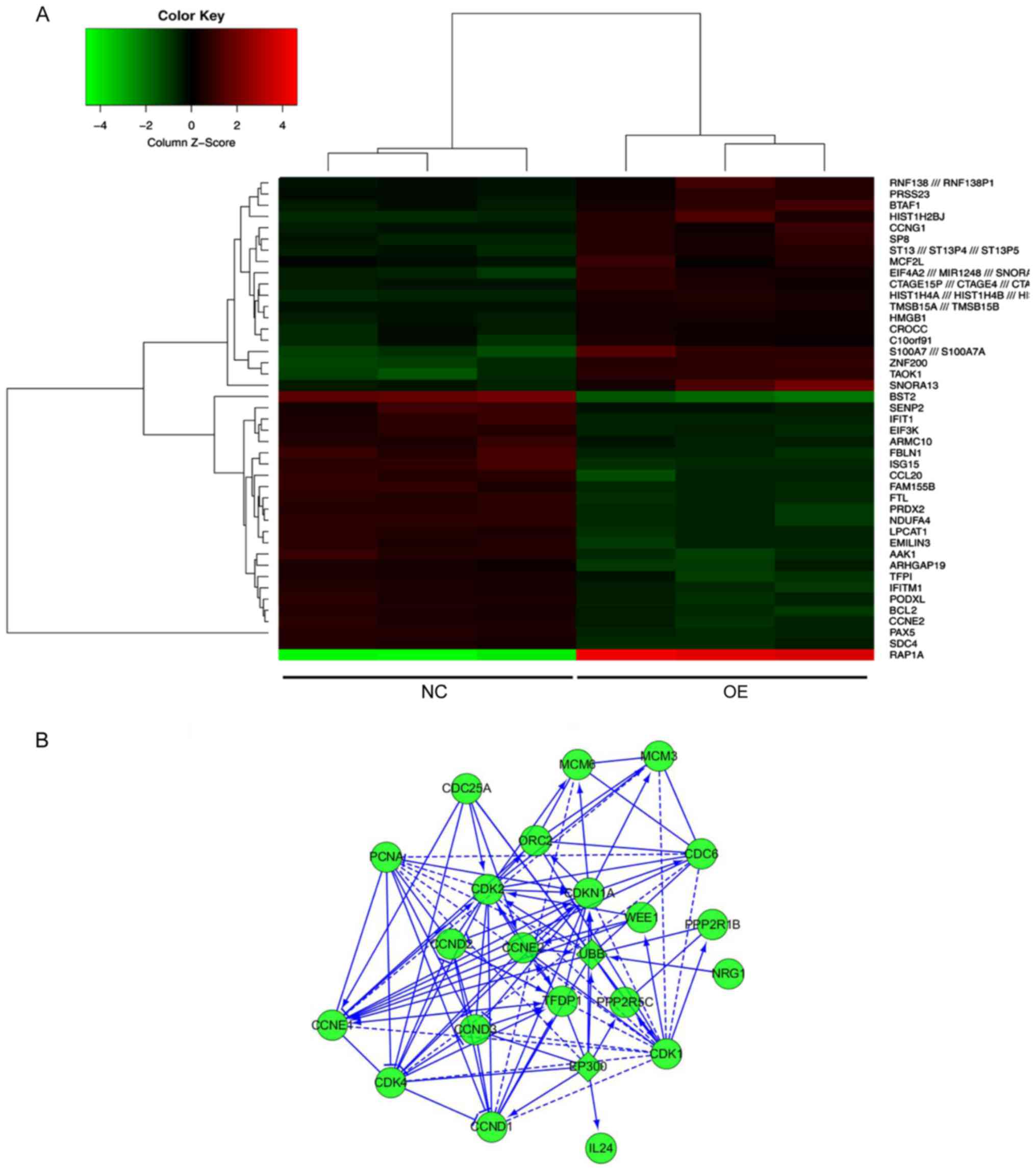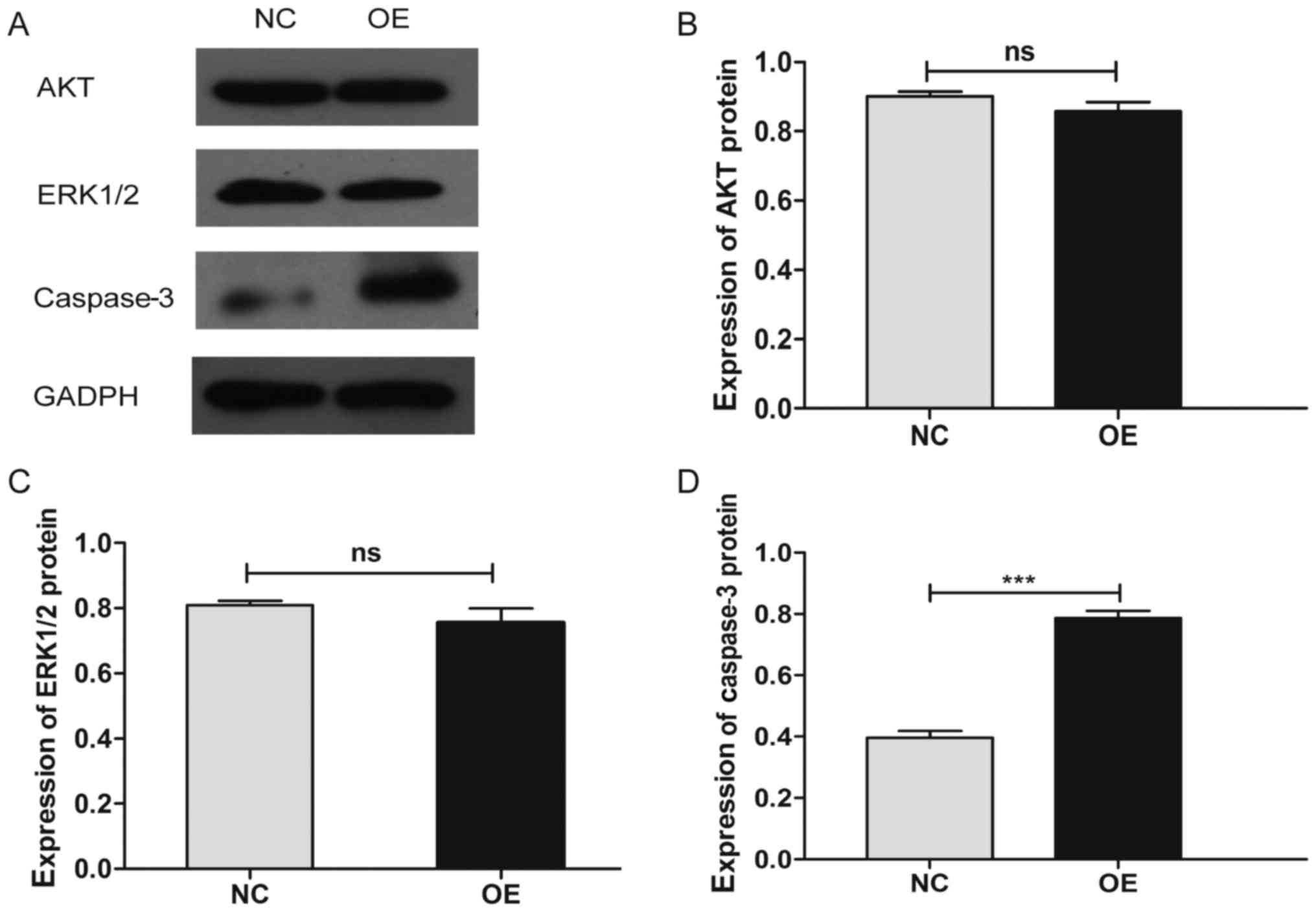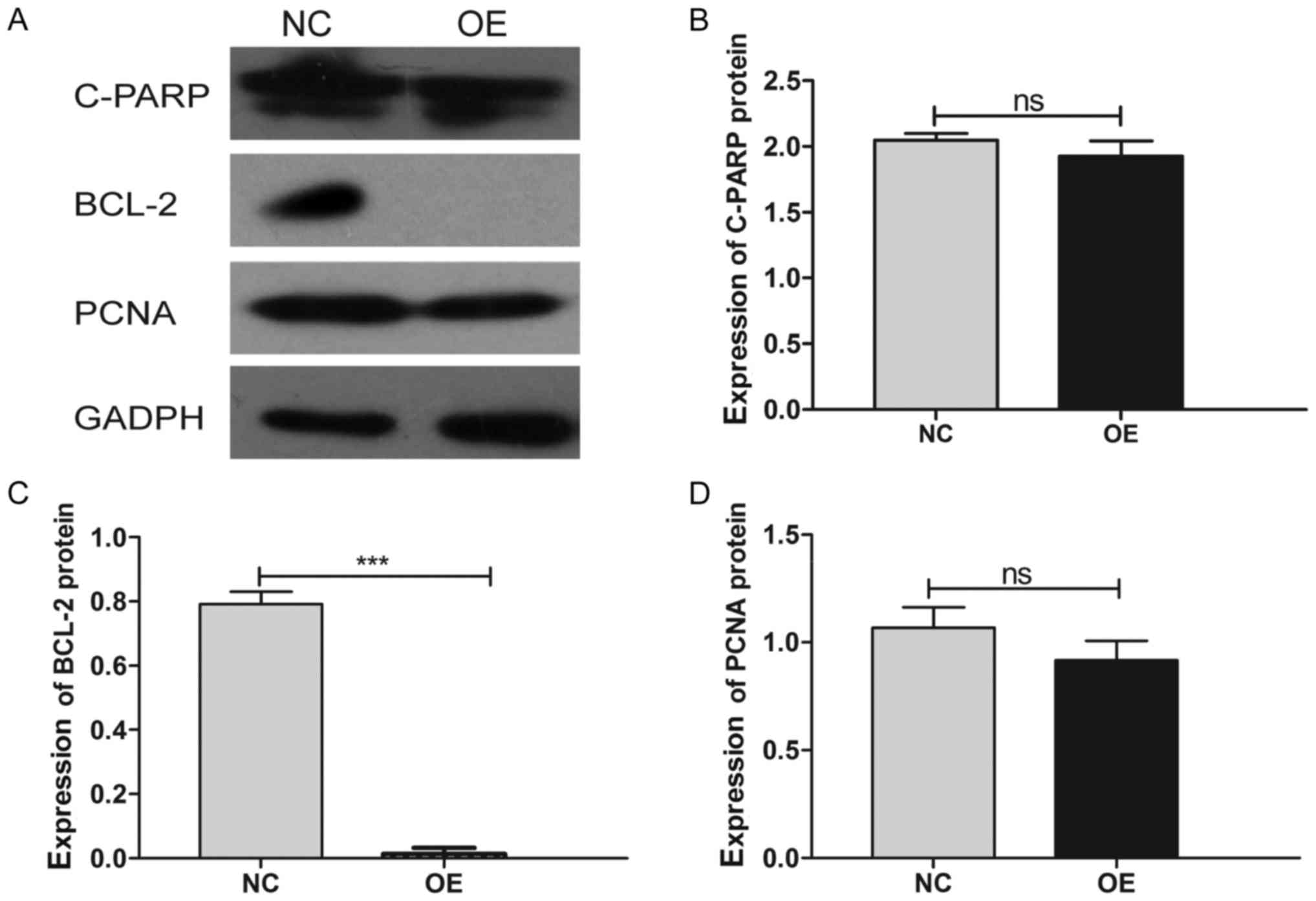|
1
|
Wang CJ, Xiao CW, You TG, Zheng YX, Gao W,
Zhou ZQ, Chen J, Xue XB, Fan J and Zhang H: Interferon-α enhances
antitumor activities of oncolytic adenovirus-mediated IL-24
expression in hepatocellular carcinoma. Mol Cancer. 11:312012.
View Article : Google Scholar : PubMed/NCBI
|
|
2
|
Han B, Liu SH, Guo WD, Zhang B, Wang JP,
Cao YK and Liu J: Notch1 downregulation combined with
interleukin-24 inhibits invasion and migration of hepatocellular
carcinoma cells. World J Gastroenterol. 21:9727–9735. 2015.
View Article : Google Scholar : PubMed/NCBI
|
|
3
|
El-Serag HB, Marrero JA, Rudolph L and
Reddy KR: Diagnosis and treatment of hepatocellular carcinoma.
Gastroenterology. 134:1752–1763. 2008. View Article : Google Scholar : PubMed/NCBI
|
|
4
|
Li J, Shi L, Zhang X, Kang X, Wen Y, Qian
H, Zhou Y, Xu W, Zhang Y, Wu M and Yin Z: Recombinant adenovirus
IL-24-Bax promotes apoptosis of hepatocellular carcinoma cells in
vitro and in vivo. Cancer Gene Ther. 17:771–779. 2010. View Article : Google Scholar : PubMed/NCBI
|
|
5
|
Xiao CW, Xue XB, Zhang H, Gao W, Yu Y,
Chen K, Zheng JW and Wang CJ: Oncolytic adenovirus-mediated
MDA-7/IL-24 overexpression enhances antitumor activity in
hepatocellular carcinoma cell lines. Hepatobiliary Pancreat Dis
Int. 9:615–621. 2010.PubMed/NCBI
|
|
6
|
Huo W, Li ZM, Zhu XM, Bao YM and An LJ:
MDA-7/IL-24 suppresses tumor adhesion and invasive potential in
hepatocellular carcinoma cell lines. Oncol Rep. 30:986–992. 2013.
View Article : Google Scholar : PubMed/NCBI
|
|
7
|
Jiang H, Lin JJ, Su ZZ, Goldstein NI and
Fisher PB: Subtraction hybridization identifies a novel melanoma
differentiation associated gene, mda-7, modulated during human
melanoma differentiation, growth and progression. Oncogene.
11:2477–2486. 1995.PubMed/NCBI
|
|
8
|
Huang EY, Madireddi MT, Gopalkrishnan RV,
Leszczyniecka M, Su Z, Lebedeva IV, Kang D, Jiang H, Lin JJ,
Alexandre D, et al: Genomic structure, chromosomal localization and
expression profile of a novel melanoma differentiation associated
(mda-7) gene with cancer specific growth suppression and apoptosis
inducing properties. Oncogene. 20:7051–7063. 2001. View Article : Google Scholar : PubMed/NCBI
|
|
9
|
Ellerhorst JA, Prieto VG, Ekmekcioglu S,
Broemeling L, Yekell S, Chada S and Grimm EA: Loss of MDA7
expression with progression of melanoma. J Clin Oncol.
20:1069–1074. 2002. View Article : Google Scholar : PubMed/NCBI
|
|
10
|
Sarkar D, Su ZZ, Vozhilla N, Park ES,
Gupta P and Fisher PB: Dual cancer specific targeting strategy
cures primary and distant breast carcinomas in nude mice. Proc Natl
Acad Sci USA. 102:pp. 14034–14039. 2005; View Article : Google Scholar : PubMed/NCBI
|
|
11
|
Caudell EG, Mumm JB, Poindexter N,
Ekmekcioglu S, Mhashilkar AM, Yang XH, Retter MW, Hill P, Chada S
and Grimm EA: The protein product of the tumor suppressor gene,
melanoma differentiation-associated gene 7, exhibits
immunostimulatory activity and is designated IL-24. J Immunol.
168:6041–6046. 2002. View Article : Google Scholar : PubMed/NCBI
|
|
12
|
Fisher PB, Gopalkrishnan RV, Chada S,
Ramesh R, Grimm EA, Rosenfeld MR, Curiel DT and Dent P: mda7/IL-24,
a novel cancer selective apoptosis inducing cytokine gene: From the
laboratory into the clinic. Cancer Biol Ther. 2 4 Suppl 1:S23–S37.
2003. View
Article : Google Scholar : PubMed/NCBI
|
|
13
|
Tong AW, Nemunaitis J, Su D, Zhang Y,
Cunningham C, Senzer N, Netto G, Rich D, Mhashilkar A, Parker K, et
al: Intratumoral injection of INGN 241, a nonreolicating
adenovector expressing the melanoma-differentiation associated
gene-7 (mda7/IL-24): Biologic outcome in advanced cancer patients.
Mol Ther. 11:160–172. 2005. View Article : Google Scholar : PubMed/NCBI
|
|
14
|
Lebedeva IV, Sauane M, Gopalkrishnan RV,
Sarkar D, Su ZZ, Gupta P, Nemunaitis J, Cunningham C, Yacoub A,
Dent P and Fisher PB: Mda7/IL-24: Exploiting cancer's Achilles'
heel. Mol Ther. 11:4–18. 2005. View Article : Google Scholar : PubMed/NCBI
|
|
15
|
Song Z, Lin J, Sun Z, Ni J and Sha Y:
RNAi-mediated downregulation of CDKL1 inhibits growth and
colony-formation ability, promotesapoptosis of human melanoma
cells. J Dermatol Sci. 79:57–63. 2015. View Article : Google Scholar : PubMed/NCBI
|
|
16
|
Diao J, Wu C, Zhang J, Liu J, Zhang X, Hao
P, Zhao S and Zhang Z: Loss of diacylglycerol kinase-Ζ inhibits
cell proliferation and survival in human gliomas. Mol Neurobiol.
53:5425–5435. 2016. View Article : Google Scholar : PubMed/NCBI
|
|
17
|
Xue XB, Xiao CW, Zhang H, Lu AG, Gao W,
Zhou ZQ, Guo XL, Zhong MA, Yang Y and Wang CJ: Oncolytic adenovirus
SG600-IL24 selectively kills hepatocellular carcinoma cell lines.
World J Gastroenterol. 16:4677–4684. 2010. View Article : Google Scholar : PubMed/NCBI
|
|
18
|
Wang X, Ye Z, Zhong J, Xiang J and Yang J:
Adenovirus-mediated Il-24 expression suppresses hepatocellular
carcinoma growth via induction of cell apoptosis and cycling arrest
and reduction of angiogenesis. Cancer Biother Radiopharm. 22:56–63.
2007. View Article : Google Scholar : PubMed/NCBI
|
|
19
|
Emdad L, Lebedeva IV, Su ZZ, Gupta P,
Sarkar D, Settleman J and Fisher PB: Combinatorial treatment of
non-small cell lung cancers with gefitinib and Ad.mda-7 enhances
apoptosis-induction and reverses resistance to a single therapy. J
Cell Physiol. 210:549–559. 2007. View Article : Google Scholar : PubMed/NCBI
|
|
20
|
Sarkar D, Su ZZ, Lebedeva IV, Sauane M,
Gopalkrishnan RV, Valerie K, Dent P and Fisher PB: mda-7 (IL-24)
mediates selective apoptosis in human melanoma cells by inducing
the coordinated overexpression of the GADD family of genes by means
of p38 MAPK. Proc Natl Acad Sci USA. 99:pp. 10054–10059. 2002;
View Article : Google Scholar : PubMed/NCBI
|
|
21
|
McKenzie T, Liu Y, Fanale M, Swisher SG,
Chada S and Hunt KK: Combination therapy of Ad-mda7 and trastuzumab
increases cell death in Her-2/neu-overexpressing breast cancer
cells. Surgery. 136:437–442. 2004. View Article : Google Scholar : PubMed/NCBI
|
|
22
|
Lebedeva IV, Su ZZ, Sarkar D,
Gopalkrishnan RV, Waxman S, Yacoub A, Dent P and Fisher PB:
Induction of reactive oxygen species renders mutant and wild-type
K-ras pancreatic carcinoma cells susceptible to Ad.mda-7-induced
apoptosis. Oncogene. 24:585–596. 2005. View Article : Google Scholar : PubMed/NCBI
|
|
23
|
Shi H, Wei LL, Yuan CF, Yang JX, Yi FP, Ma
YP and Song FZ: Melanoma differentiation-associated
gene-7/interleukin 24 inhibits invasion and migration of human
cervical cancer cells in vitro. Saudi Med J. 11:1671–1675.
2007.
|
|
24
|
Menezes ME, Shen XN, Das SK, Emdad L, Guo
C, Yuan F, Li YJ, Archer MC, Zacksenhaus E, Windle JJ, et al:
MDA-7/IL-24 functions as a tumor suppressor gene in vivo in
transgenic mouse models of breast cancer. Oncotarget.
6:36928–36942. 2015. View Article : Google Scholar : PubMed/NCBI
|
|
25
|
Saito Y, Miyahara R, Gopalan B, Litvak A,
Inoue S, Shanker M, Branch CD, Mhashilkar AM, Roth JA, Chada S and
Ramesh R: Selective induction of cell cycle arrest and apoptosis in
human prostate cancer cells through adenoviral transfer of the
melanoma differentiation associated-7 (mda-7)/interleukin-24
(IL-24) gene. Cancer Gene Ther. 12:238–247. 2005. View Article : Google Scholar : PubMed/NCBI
|
|
26
|
Kawabe S, Nishikawa T, Munshi A, Roth JA,
Chada S and Meyn RE: Adenovirus-mediated mda-7 gene expression
radiosensitizes non-small cell lung cancer cells via
TP53-independent mechanisms. Mol Ther. 6:637–644. 2002. View Article : Google Scholar : PubMed/NCBI
|
|
27
|
Sauane M, Gopalkrishnan RV, Sarkar D, Su
ZZ, Lebedeva IV, Dent P, Pestka S and Fisher PB: MDA-7/IL-24: Novel
cancer growth suppressing and apoptosis inducing cytokine. Cytokine
Growth Factor Rev. 14:35–51. 2003. View Article : Google Scholar : PubMed/NCBI
|
|
28
|
Sauane M, Gopalkrishnan RV, Lebedeva I,
Mei MX, Sarkar D, Su ZZ, Kang DC, Dent P, Pestka S and Fisher PB:
Mda-7/IL-24 induces apoptosis of diverse cancer cell lines through
JAK/STAT-independent pathways. J Cell Physiol. 196:334–345. 2003.
View Article : Google Scholar : PubMed/NCBI
|
|
29
|
Su ZZ, Lebedeva IV, Sarkar D,
Gopalkrishnan RV, Sauane M, Sigmon C, Yacoub A, Valerie K, Dent P
and Fisher PB: Melanoma differentiation associated gene-7,
mda-7/IL-24, selectively induces growth suppression, apoptosis and
radiosensitization in malignant gliomas in a p53-independent
manner. Oncogene. 22:1164–1180. 2003. View Article : Google Scholar : PubMed/NCBI
|
|
30
|
Su ZZ, Lebedeva IV, Sarkar D, Emdad L,
Gupta P, Kitada S, Dent P, Reed JC and Fisher PB: Ionizing
radiation enhances therapeutic activity of mda-7/IL-24: Overcoming
radiation- and mda-7/IL-24-resistance in prostate cancer cells
overexpressing the antiapoptotic proteins bcl-xL or bcl-2.
Oncogene. 25:2339–2348. 2006. View Article : Google Scholar : PubMed/NCBI
|
|
31
|
Tahara I, Miyake K, Hanawa H, Kurai T,
Hirai Y, Ishizaki M, Uchida E, Tajiri T and Shimada T: Systemic
cancer gene therapy using adeno-associated virus type 1 vector
expressing MDA-7/IL24. Mol Ther. 15:1805–1811. 2007. View Article : Google Scholar : PubMed/NCBI
|
|
32
|
Zhao Z, Liu J, Wang C, Wang Y, Jiang Y and
Guo M: MicroRNA-25 regulates small cell lung cancer cell
development and cell cycle through cyclin E2. Int J Clin Exp
Pathol. 7:7726–7734. 2014.PubMed/NCBI
|
|
33
|
Ye L, Guo L, He Z, Wang X, Lin C, Zhang X,
Wu S, Bao Y, Yang Q, Song L and Lin H: Upregulation of E2F8
promotes cell proliferation and tumorigenicity in breast cancer by
modulating G1/S phase transition. Oncotarget. 17:23767–23771.
2016.
|
|
34
|
Hwang HC and Clurman BE: Cyclin E in
normal and neoplastic cell cycles. Oncogene. 24:2776–2786. 2005.
View Article : Google Scholar : PubMed/NCBI
|
|
35
|
Zhao S, Qiu ZX, Zhang L and Li WM:
Prognostic values of ERK1/2 and p-ERK1/2 expressions for poor
survival in non-small cell lung cancer. Tumor Biol. 36:4143–4150.
2015. View Article : Google Scholar
|
|
36
|
Li Q and Yang Z: Expression of
phospho-ERK1/2 and PI3-K in benign and malignant gallbladder
lesions and its clinical and pathological correlations. J Exp Clin
Cancer Res. 28:652009. View Article : Google Scholar : PubMed/NCBI
|
|
37
|
Sabokrouh A, Vaisi-Raygani A, Goodarzi MT,
Khatami S, Taghizadeh-Jahed M, Shahabadi N, Lakpour N and Shakiba
Y: Comparison between platinum-azidothymidine and azidothymidine
effects on Bcl-2 and telomerase gene expression in rats with
hepatocellular carcinoma. Avicenna J Med Biotech. 7:50–56.
2015.
|
|
38
|
Zhao N, Sun BC, Zhao XL, Wang Y, Meng J,
Che N, Dong XY and Gu Q: Role of Bcl-2 and its associated miRNAs in
vasculogenic mimicry of hepatocellular carcinoma. Int J Clin Exp
Pathol. 8:15759–15768. 2015.PubMed/NCBI
|
|
39
|
Correia C, Lee SH, Meng XW, Vincelette ND,
Knorr KL, Ding H, Nowakowski GS, Dai H and Kaufmann SH: Emerging
understanding of Bcl-2 biology: Implications for neoplastic
progression and treatment. Biochim Biophys Acta. 1853:1658–1671.
2015. View Article : Google Scholar : PubMed/NCBI
|
|
40
|
Xu LF, Ni JY, Sun HL, Chen YT and Wu YD:
Effects of hypoxia-inducible factor-1α silencing on the
proliferation of CBRH-7919 hepatoma cells. World J Gastroenterol.
19:1749–1759. 2013. View Article : Google Scholar : PubMed/NCBI
|
|
41
|
Mackenzie RW and Elliott BT: Akt/PKB
activation and insulin signaling: A novel insulin signaling pathway
in the treatment of type 2 diabetes. Diabetes Metab Syndr Obes.
7:55–64. 2014. View Article : Google Scholar : PubMed/NCBI
|
|
42
|
Cui R, Kim T, Fassan M, Meng W, Sun HL,
Jeon YJ, Vicentini C, Tili E, Peng Y, Scarpa A, et al: MicroRNA-224
is implicated in lung cancer pathogenesis through targeting
caspase-3 and caspase-7. Oncotarget. 6:21802–21815. 2015.
View Article : Google Scholar : PubMed/NCBI
|















